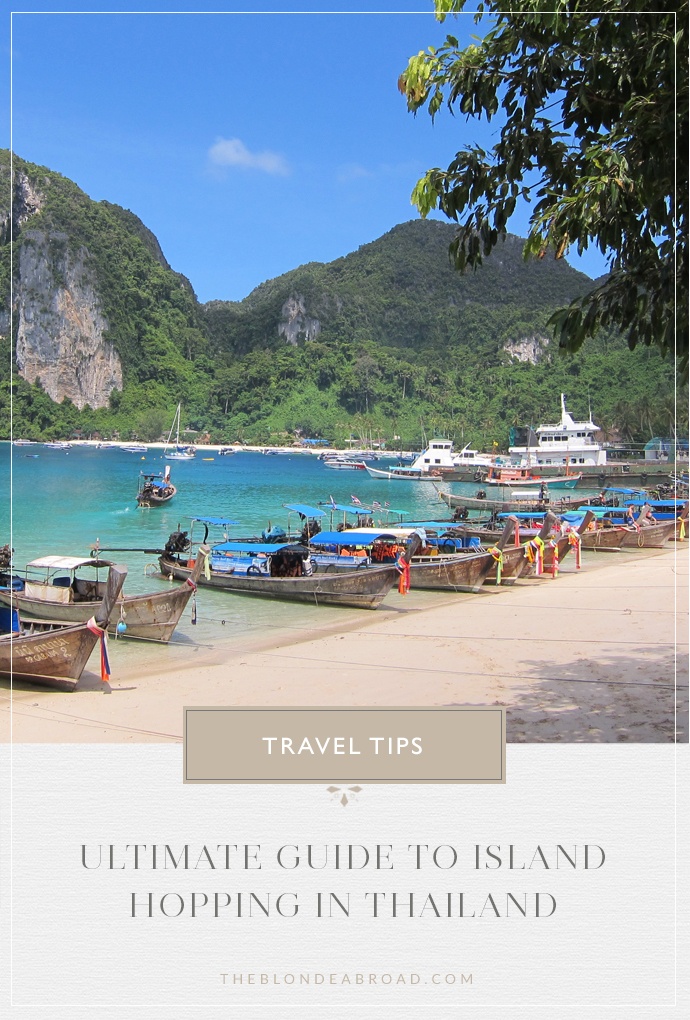Essential Thailand Travel Tips for European Visitors

Introduction
After securing your travel documents and familiarizing yourself with Thailand's visa requirements, it's time to delve into essential tips to ensure a safe and memorable trip. From health and safety precautions to navigating the bustling streets, this guide aims to equip you with all the necessary information for a smooth travel experience in the Land of Smiles.
Preparing for Your Adventure
- Excitement Builds: As you embark on your journey to Thailand, the anticipation of exploring its rich culture and scenic beauty is sure to captivate you.
- Smooth Travel Essentials: To make the most of your trip, it's crucial to be well-prepared in terms of health, safety, communication, and more.
In this guide, we will cover:
- Travel Documents and Visa Requirements: Understanding what you need to enter the country legally.
- Health and Safety Tips: Ensuring you stay healthy and safe throughout your stay.
- Currency and Payment: Managing your finances in a foreign land.
- Communication and Language: Overcoming language barriers for seamless interactions.
As you navigate through this comprehensive guide, you'll be equipped with valuable insights to help you navigate Thailand like a seasoned traveler. Let's dive into the details of each aspect to ensure a smooth and enjoyable journey in the enchanting realm of Thailand.

Travel Documents and Visa Requirements
After preparing yourself for an exciting adventure in Thailand, it's vital to ensure that your travel documents are in order. From passports to visas, understanding the requirements is essential for a hassle-free trip.
Passport and Visa
- Passport Validity: Ensure your passport is valid for at least six months beyond your intended stay in Thailand.
- Tourist Visa: European visitors can enter Thailand without a visa for stays of up to 30 days. If your trip exceeds this duration, you may need to apply for a visa in advance.
Visa Exemption for European Visitors
- 30-Day Exemption: As a European passport holder, you can enjoy visa-free entry for tourism purposes for up to 30 days.
- Visa Extension: If you wish to stay longer than 30 days, you can apply for a visa extension at the nearest Thai immigration office.
Understanding the passport and visa requirements will help you enter Thailand without any issues. Now, let's explore crucial health and safety tips to ensure a smooth and worry-free journey through the Land of Smiles.

Health and Safety Tips
As you gear up for your Thai adventure, prioritizing your health and safety is paramount to having a worry-free trip. From vaccinations to safety precautions, here's a guide to help you stay healthy and secure during your time in Thailand.
Vaccinations and Health Insurance
- Recommended Vaccinations: Ensure you are up-to-date on routine vaccines like measles, mumps, rubella, and consider vaccinations for hepatitis A and typhoid.
- Travel Health Insurance: It's advisable to purchase comprehensive travel health insurance to cover any unforeseen medical expenses during your trip.
Safety Precautions
- Stay Hydrated: Thailand's tropical climate can be intense, so remember to drink plenty of water to stay hydrated.
- Avoid Tap Water: Stick to bottled water to prevent any risk of water-borne illnesses.
- Beware of Scams: Be cautious of tourist scams and only use licensed taxis or transportation services.
- Emergency Numbers: Save local emergency numbers and contact information for your embassy in case of any emergencies.
By prioritizing your health and taking necessary safety measures, you can enjoy a worry-free journey through Thailand's captivating landscapes and vibrant streets. Next, we'll uncover tips on managing currency and payments in the country to ensure smooth financial transactions during your stay.

Currency and Payment
After taking care of your health and safety, understanding the local currency and payment options in Thailand is essential for a seamless travel experience. Familiarize yourself with the Thai Baht and various payment methods to manage your finances effectively during your trip.
Thai Baht Currency
- Official Currency: The official currency of Thailand is the Thai Baht (THB), symbolized as ฿.
- Notes and Coins: Thai Baht is available in denominations of notes (20, 50, 100, 500, and 1,000 THB) and coins (1, 2, 5, and 10 THB).
- Currency Symbol: The Thai Baht symbol is similar to the pound sterling (£) but with an additional vertical line through the centre.
Payment Methods and Currency Exchange
- Cash is King: While credit cards are widely accepted in urban areas, it's advisable to carry cash for smaller transactions and in rural areas.
- ATMs: ATMs are prevalent in cities and tourist areas, offering convenient access to cash. Be mindful of transaction fees when using international cards.
- Currency Exchange: Banks and money exchange counters are reliable places to exchange foreign currency. Avoid exchanging money at airports for better rates.
- Travel Cards: Consider using prepaid travel cards or digital payment apps for convenience and security during your travels.
By understanding the Thai currency and available payment methods, you can navigate financial transactions with ease while exploring the diverse offerings of Thailand. Next, let's delve into overcoming language barriers and ensuring seamless communication during your trip.
Communication and Language
Navigating through Thailand involves more than just physical movement; effective communication plays a crucial role in enhancing your travel experience. Overcome language barriers and stay connected with ease by exploring language solutions and ensuring internet access during your trip.
Language Barrier
- Thai Language: The official language in Thailand is Thai, but English is widely spoken in tourist areas and major cities.
- Basic Phrases: Learning a few basic Thai phrases like "hello" (Sawadee) and "thank you" (Kob Khun) can go a long way in local interactions.
- Translation Apps: Utilize translation apps on your smartphone to bridge language gaps and communicate effectively with locals.
SIM cards and Internet Access
- Local SIM Cards: Purchase a local SIM card upon arrival in Thailand to enjoy affordable data plans and stay connected throughout your journey.
- Internet Cafes: Easily accessible in urban areas, internet cafes offer a budget-friendly option for internet access and communication.
- Wi-Fi Hotspots: Hotels, restaurants, and cafes often provide free Wi-Fi, allowing you to connect with loved ones and access essential information on the go.
By addressing the language barrier through simple phrases and digital tools and ensuring reliable internet access with local SIM cards or Wi-Fi hotspots, you can communicate seamlessly and navigate through Thailand's bustling streets and markets with confidence. As you prepare to explore the vibrant culture and traditions, understanding cultural etiquette and practices will further enrich your travel experience.

Cultural Tips and Etiquette
Immersing yourself in Thailand's vibrant culture goes beyond sightseeing; it involves embracing local traditions and observing proper etiquette. From understanding dress codes to showing respect for Thai customs, here are essential cultural tips to enhance your travel experience in the Land of Smiles.
Dress Code
- Modesty is Key: When visiting temples and religious sites, dress modestly by covering your shoulders and knees out of respect.
- Footwear Etiquette: Remove your shoes before entering someone's home or certain establishments, following the Asian custom of leaving footwear outside.
- Beach Attire: While beachwear is acceptable at seaside locations, wearing revealing clothing in public areas may not be culturally appropriate.
Respect for Thai Culture
- Wai Greeting: The traditional Thai greeting, known as the Wai, involves placing your palms together in a prayer-like gesture and bowing slightly. Return the gesture when greeted in this manner.
- Show Reverence to Monks: When interacting with Buddhist monks, show reverence by avoiding physical contact and refraining from higher seating positions than the monk.
- Respectful Behavior: Demonstrate respect for local customs and traditions, such as refraining from public displays of affection and speaking softly in public spaces.
By adhering to the dress codes, practicing cultural customs like the Wai greeting and showing reverence to local traditions, you can foster positive interactions with Thai locals and deepen your understanding of the country's cultural richness.
As you navigate through Thailand's bustling streets and scenic landscapes, efficient transportation is key to exploring the diverse attractions seamlessly. Let's delve into transportation options and tips for getting around the country.
Transportation and Getting Around
As you explore the wonders of Thailand, efficient transportation plays a vital role in enhancing your travel experience. From navigating through bustling cities to reaching remote destinations, understanding the various transportation options will help you traverse the country with ease.
Public Transport
- BTS and MRT: In Bangkok, the BTS Skytrain and MRT subway offer efficient and convenient ways to travel around the city, especially during peak hours.
- Songthaews and Buses: Songthaews (shared pickup trucks) and buses are common modes of transport in other Thai cities and towns, providing affordable options for exploring local areas.
Taxis and Tuk-tuks
- Taxi Services: Metered taxis are readily available in urban areas, but ensure the driver uses the meter or negotiates a fare before starting your journey.
- Tuk-tuks: Tuk-tuks, three-wheeled motorized vehicles, are popular for short rides and sightseeing trips. Bargain the fare before hopping on for a ride.
- Motorbike Taxis: Motorbike taxis are a quick and convenient way to navigate through traffic-clogged streets, commonly seen in urban areas.
Efficiently utilizing public transport options like the BTS, MRT, buses, and Songthaews, as well as understanding the nuances of taxi services and tuk-tuks, will enable you to explore Thailand's diverse attractions seamlessly. Next, let's uncover the various accommodation options available in the country to ensure a comfortable stay during your journey.

Accommodation Options
Choosing the right accommodation is crucial for a comfortable and enjoyable stay in Thailand. From luxurious hotels to unique alternative choices, exploring diverse accommodation options will enhance your travel experience in this captivating destination.
Hotels and Resorts
- Luxury Retreats: Thailand boasts a plethora of luxurious hotels and resorts, offering world-class amenities, stunning views, and impeccable service.
- Beachfront Escapes: Experience ultimate relaxation at beachfront resorts in popular destinations like Phuket, Koh Samui, and Krabi, where pristine beaches are just a step away.
Alternative Accommodation Choices
- Boutique Hotels: Opt for boutique hotels for a personalized and intimate stay, often showcasing unique designs and local charm.
- Home Stays: Immerse yourself in Thai culture by staying with local families in traditional homestays, providing an authentic and enriching experience.
- Hostels and Guesthouses: Budget-conscious travelers can choose from a wide range of hostels and guesthouses, ideal for meeting fellow adventurers and exploring on a shoestring budget.
Exploring accommodation options such as luxury hotels, beachfront resorts, boutique stays, homestays, hostels, and guesthouses allows you to tailor your stay to your preferences and budget.
After securing a comfortable haven for your travels, discovering Thailand's diverse culinary landscape is the next exciting adventure on your agenda. Let's delve into the enticing world of Thai cuisine and dining etiquette.

Food and Dining
Exploring Thailand's culinary delights is an integral part of immersing yourself in the country's rich culture. From indulging in local cuisine to observing dining etiquette, savouring Thai flavours will be a highlight of your travel experience.
Local Cuisine
- Street Food Delights: Dive into Thailand's vibrant street food scene, where bustling markets offer a plethora of dishes such as Pad Thai, Som Tum (green papaya salad), and Mango Sticky Rice.
- Tom Yum and Green Curry: Sample iconic dishes like Tom Yum Goong (spicy shrimp soup) and Gaeng Keow Wan (green curry) for a burst of authentic Thai flavors.
- Fresh Seafood: Coastal regions like Phuket and Krabi are renowned for their fresh seafood offerings, from grilled fish to seafood platters.
Dining Etiquette
- Sharing is Caring: Thai meals are often served family-style, encouraging sharing dishes among diners to foster a sense of community and camaraderie.
- Chopsticks and Spoons: While chopsticks are used for noodle dishes, Thais typically eat rice with a spoon. Avoid using forks to respect local dining customs.
- Respectful Gestures: Show respect by not pointing your feet at others, as feet are considered the lowest part of the body in Thai culture.
By embracing Thailand's diverse culinary landscape and observing dining etiquette, you'll not only tantalize your taste buds but also forge a deeper connection with the local culture. As your Thai adventure comes to an end, let's recap the essential travel tips for European visitors to ensure a smooth and memorable journey through the enchanting realm of Thailand.
Conclusion
As your virtual journey through Thailand comes to a close, reflecting on the essential travel tips for European visitors will help you make the most of your time in this captivating destination. From managing travel documents to embracing cultural customs, here's a recap to ensure a memorable and seamless adventure in the Land of Smiles.
Recap of Essential Thailand Travel Tips for European Visitors
- Travel Documents: Ensure your passport is valid and familiarize yourself with visa requirements, especially the 30-day visa exemption for European visitors.
- Health and Safety: Stay healthy with recommended vaccinations and travel insurance. Follow safety precautions and stay vigilant against common travel risks.
- Currency Management: Get acquainted with the Thai Baht and utilize various payment methods for convenient transactions. Consider local SIM cards for internet access.
- Communication Tips: Overcome language barriers with basic Thai phrases and translation apps. Stay connected with local SIM cards and Wi-Fi hotspots.
- Cultural Awareness: Respect dress codes, customs, and traditions to immerse yourself respectfully in Thai culture. Practice proper etiquette and greetings.
- Transportation Options: Explore public transport, taxis, tuk-tuks, and other modes for efficient travel throughout the country.
- Accommodation Choices: Choose from hotels, resorts, boutique stays, and alternative accommodations to suit your preferences and budget.
- Food and Dining: Indulge in local cuisine, street food delights, and observe dining etiquette for an authentic gastronomic experience.
By incorporating these travel tips into your itinerary, you're well-equipped to navigate the vibrant streets, serene beaches, and cultural wonders of Thailand with confidence and ease. May your Thai adventure be filled with unforgettable moments and enriching cultural experiences!
